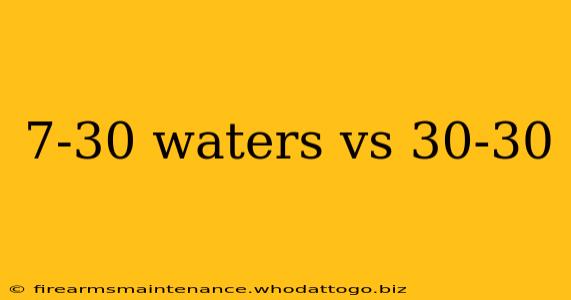Choosing the right ammunition can significantly impact your shooting experience, accuracy, and overall performance. For many shooters, particularly those interested in hunting or long-range target practice, the debate often revolves around two popular cartridge families: 7-30 Waters and 30-30 Winchester. This detailed comparison will help you understand the key differences and determine which cartridge best suits your needs.
Understanding the Contenders: 7-30 Waters and 30-30 Winchester
Both the 7-30 Waters and the 30-30 Winchester are popular lever-action cartridges known for their reliability and effectiveness in various hunting scenarios. However, their distinct characteristics make them better suited for different applications.
7-30 Waters: The Versatile Performer
The 7-30 Waters, developed by Warren Page, is a relatively recent cartridge compared to the venerable 30-30. It's known for its versatility, offering a balance of flat trajectory, good accuracy, and manageable recoil. The smaller bullet diameter (7mm) allows for higher velocity with similar powder charges compared to the .30 caliber 30-30, resulting in a flatter trajectory at longer ranges. This makes it suitable for shots beyond the typical effective range of the 30-30.
Key Advantages of 7-30 Waters:
- Flatter trajectory: Improved accuracy at longer ranges due to less bullet drop.
- Higher velocity: Achieves greater speed with similar powder charges.
- Reduced recoil: More comfortable shooting experience, especially for extended periods.
- Better penetration: While not as pronounced as the 30-30, the 7mm bullet still offers adequate penetration for hunting medium-sized game.
30-30 Winchester: The Classic Workhorse
The 30-30 Winchester, a century-old cartridge, remains a popular choice for deer hunting and plinking. Its widespread availability, relatively low cost, and proven effectiveness make it a classic among lever-action enthusiasts. The heavier, larger diameter (.30 caliber) bullet delivers significant stopping power at closer ranges.
Key Advantages of 30-30 Winchester:
- Stopping power: The larger bullet diameter delivers substantial energy transfer, making it effective for hunting deer and other medium-sized game at shorter ranges.
- Wide availability: Ammunition is readily available and relatively inexpensive.
- Extensive history and familiarity: Years of proven performance and a large user base.
- Relatively simple reloading: The cartridge's design makes it easier to reload for those who prefer to handload their ammunition.
Head-to-Head Comparison: 7-30 Waters vs. 30-30 Winchester
| Feature | 7-30 Waters | 30-30 Winchester |
|---|---|---|
| Caliber | 7mm (.284 inch) | .30 caliber (.308 inch) |
| Velocity | Generally higher | Generally lower |
| Trajectory | Flatter | More pronounced bullet drop |
| Recoil | Lower | Higher |
| Stopping Power | Good, particularly at longer ranges | Excellent at closer ranges |
| Availability | Less widely available than 30-30 | Widely available and relatively inexpensive |
| Cost | Generally more expensive than 30-30 | Generally less expensive than 7-30 Waters |
| Best suited for | Longer-range shooting, medium game hunting | Shorter-range shooting, deer hunting |
Conclusion: Choosing the Right Cartridge
The "better" cartridge depends entirely on your specific needs and shooting preferences. If you prioritize longer-range accuracy, flatter trajectory, and reduced recoil, the 7-30 Waters is an excellent choice. However, if you need a proven, readily available, hard-hitting cartridge for close-range hunting and you value affordability, the 30-30 Winchester remains a classic and reliable option. Consider your hunting style, the typical distances at which you shoot, and your budget when making your decision. Ultimately, the best way to decide is to try both cartridges and see which one suits you best.

